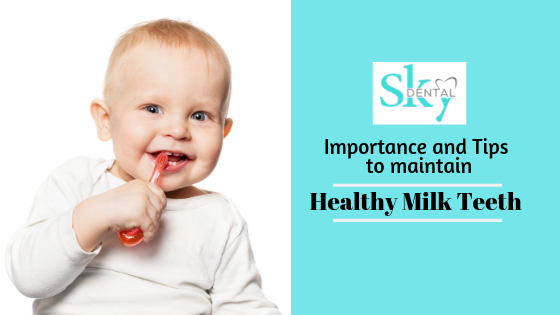About Milk Teeth:
Milk Teeth are the first set of teeth in the growth development of humans. The primary teeth form during the embryo stage of human life but eventually develop and starts to appear as early as 6 months after birth.
Although milk teeth are temporary, they still need a lot of care and maintenance. If the milk teeth are well looked after, then it is more likely that the permanent teeth will grow in their right position.
Frequently asked questions about Paediatric Dentistry:
1. What’s the best way to take care of your baby’s teeth?
Ensuring Healthy teeth for life begins even before the first tooth appears. Start by wiping your baby’s gums gently in circular motions after feeding to help reduce the bacteria. As soon as you see a tooth, start brushing the teeth using a toothbrush with soft bristles and a small head.
2. How do I avoid my child from getting rotten teeth?
Baby tooth decay results from leftover sugar sticking to the teeth. The sugar becomes acidic
and can then break down the enamel. This sugar can come from residual milk, juice, or any
other food left in the mouth after eating. Here are some tips to help avoid a decayed tooth.
a) Establish good brushing habits
b) Avoid giving sugary foods and drinks
c) Serve Calcium-rich foods
d) Avoid giving frequent snacks
e) Avoid bottle rot (Baby bottle tooth decay or “bottle rot” occurs when a baby drinks
frequently during the day from a bottle, or is put to bed with a bottle, filled with
formula, milk, juice, soft drinks, sugar water, or sugary drinks.)
f) Treat Signs of Decay Early.
3. Baby teeth eventually fall out, so why is dental care so important?
Even though your child will lose his milk teeth, proper care for them, including fillings,
coatings, and extraction of teeth that have died, are all part of ensuring that the teeth
underneath and the jaw develops well and stays healthy.
4. Is teething painful?
Yes. When babies are teething, they often have sore and tender gums. The pain can usually soothe by gently rubbing the baby’s gums with a clean finger or any other safe products.
5. Are pacifiers bad for my child?
Not really. If they are used for a limited time, they are sort of beneficial. A pacifier might help reduce the risk of Sudden Infant Death Syndrome (SIDS). Sucking on a pacifier during naptime and bedtime might reduce the risk of SIDS. A child should not use any kind of pacifier beyond about age 4 because it could be a hindrance in the development and growth of permanent teeth.
This article is intended to promote understanding of and knowledge about general oral health topics. It is not intended to be a substitute for professional advice, diagnosis or treatment. Always seek the advice of your dentist at dental hospital qualified healthcare provider with any questions you may have regarding a medical condition or treatment.


